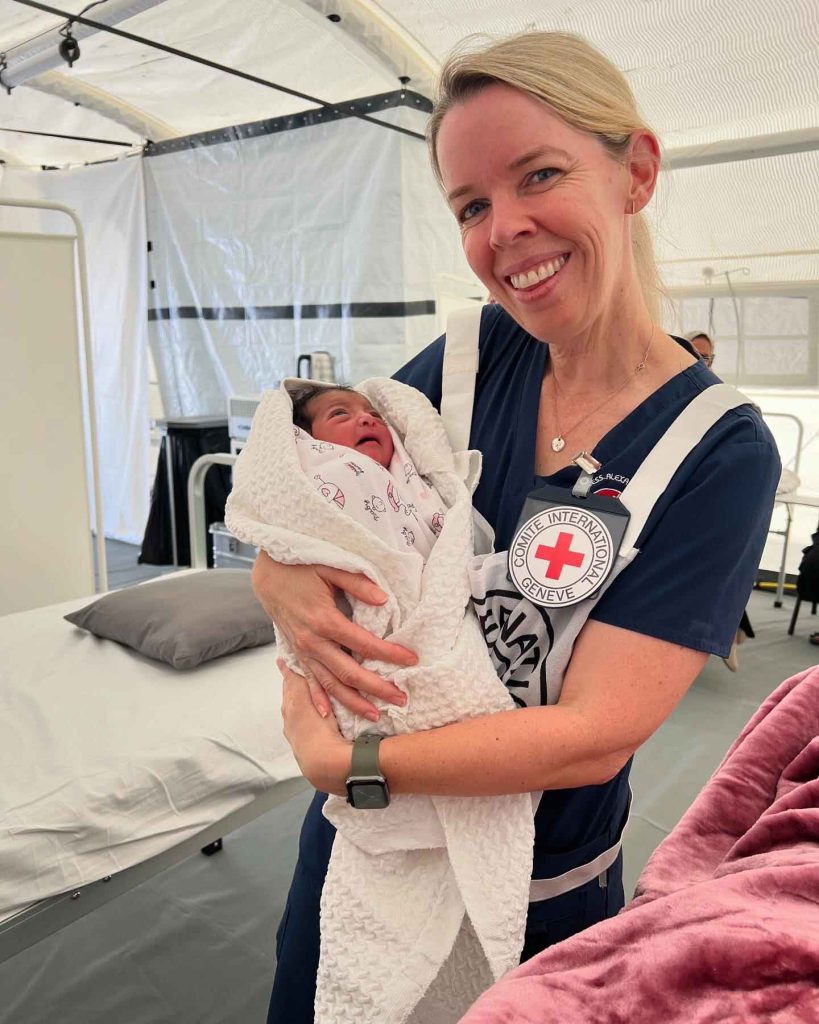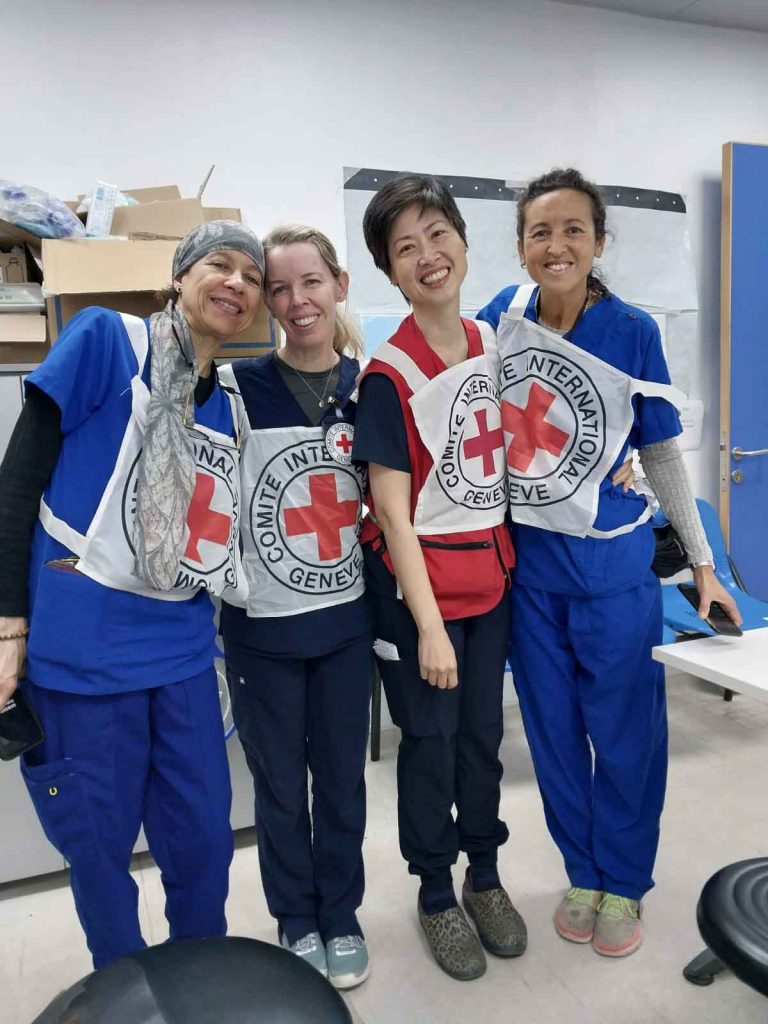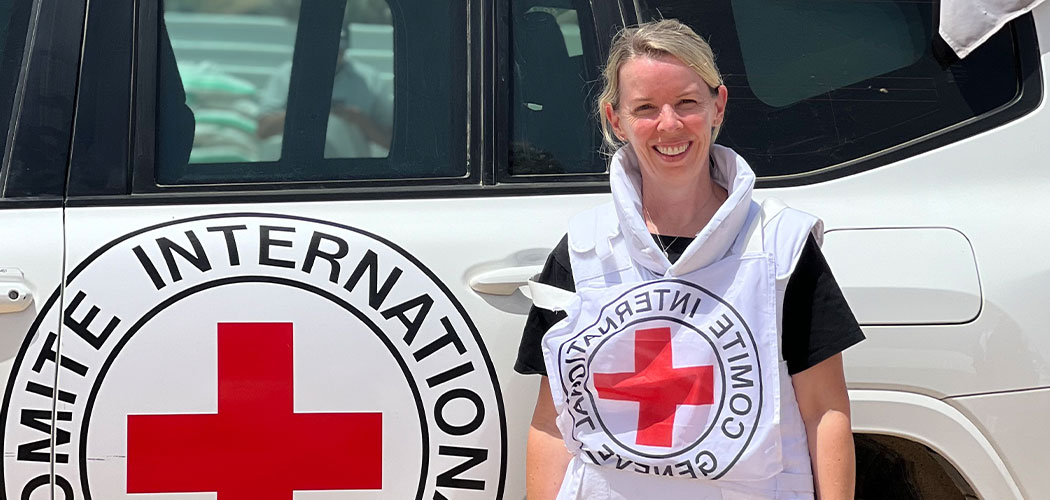For Brisbane-based Red Cross humanitarian nurse Ruth Jebb, responding to some of the world’s biggest emergencies – no matter how dangerous – has always been a given.
I’ve never known a day consciously that I haven’t wanted to be a humanitarian,” she reflects. “And I knew that nursing was a pathway to really take a useful skill into those spaces.”
One of Australian Red Cross’ longest serving humanitarian aid workers, Ruth has been deployed to conflict and disaster zones for more than two decades. This includes coordinating a feeding clinic for thousands of malnourished children in Sudan, supporting disaster relief following Typhoon Haiyan in the Philippines, and caring for injured people after the 2015 Nepal earthquakes.
Yet her most recent mission – to Gaza in April 2024 amid the ongoing conflict between Israel and Hamas, the militant group that governs the Gaza strip – was unlike anything she had ever experienced.
Tragically, the war continues to cause widespread devastation, with tens of thousands of Palestinians killed or injured, and much of Gaza’s infrastructure destroyed. There is limited access to food, water and medical care.
Ruth, a Clinical Nurse Consultant at Princess Alexandra Hospital’s emergency department, was deployed as a surgical ward nurse to work in the European Gaza Hospital located in Khan Younis, in southern Gaza.
The Red Cross were allocated a portion of the hospital to treat patients, including men, women and children, and perform surgeries. Ruth was put in charge of the children’s ward.
“Unlike other war zones that I’ve worked in, the majority of the injuries were directly war-related,” reveals Ruth.
“We saw bomb blast injuries, gunshot wounds, and a lot of burns. The blast injuries were the most predominant.”

Despite being one of the Australian Red Cross’ most experienced delegates, Ruth says Gaza tested her resolve like never before, largely due to its small size, which offered no buffer from the frontline of war.
“The war is on top of you. Bombs were dropping 500 metres from the perimeter of the hospital, and we were finding shrapnel inside the walls of the hospital – you felt like you were in the war zone.
“It was just day in, day out, and you couldn’t escape it. What really stood out to me was the reaction from the local people and staff. They were scared and they were fearful every single day.
“You’re in this bubble of fear trying to do a job, trying to provide comfort and support and do the best you can with constraints on top of that like poor water supply, a broken sanitation system and unreliable electricity.”
Despite the trauma of navigating an environment where danger was constant and basic resources limited, Ruth, who was honoured with the International Red Cross’ highest honour, the Florence Nightingale Award, in 2017, says she has no regrets. But she admits she doesn’t know if she could return to Gaza right now.
“As long as there’s people in need that need healthcare, then there’s a role for me to play and a job to be done. If you’ve got the means and the skills to do it, in my mind, how can you say no? The challenge for me has been balancing that with family life and my commitment to my children and partner.”
A year on, the humanitarian crisis in Gaza remains dire. Ruth stays in contact with some staff still on the ground, including midwives working in the field hospital having to flex into other roles and treat the rising wounded with gunshot wounds and blast injuries.
“I don’t know how [the staff] are functioning, but they continue to remain admirably resilient and focused on their role as healthcare workers” Ruth says.
“It’s the lack of supplies that are getting into the country, but also the volume of trauma that they’re still receiving. The field hospital, which is still running, have had an enormous number of mass casualty events in the last five months that have just overwhelmed their resources, including receiving 200 trauma patients from one incident. That’s not uncommon; they’re having those multiple times a week.”

The Australian Nursing and Midwifery Federation (ANMF) recently partnered with Australian Red Cross to launch its Nurses and Midwives for Peace campaign, standing as a voice for global peace and calling for an end to the violence that threatens our shared humanity.
Ruth believes nurses and midwives in Australia can show solidarity by “focusing on standing up for humanity and basic human rights such as unrestricted access to healthcare, food and clean water, rather than debating political sides or opinions” and respecting everyone’s view.
“The fact is humanity is suffering, including the most vulnerable – the disabled, elderly, children and women and that is the greatest tragedy and something we need to continue to advocate for. It doesn’t matter who the perpetrators are, they should be held accountable” she says.
“Nurses have a unique opportunity to care for people in all of their settings,” she explains. We can’t forget about the fact that we have wars going on and we need to maintain the conversation that there is need beyond our own borders.
“I would say to nurses and midwives – be good at what you do. Respect the people that are right in front of you. Show kindness and love in our daily jobs. The way we talk about these conflicts is also a way that we can support people from afar.”
Asked what has stayed with her most from Gaza, Ruth doesn’t hesitate.
“It’s always the individual stories. I get very attached to my patients no matter where I am but in this kind of context, you get to know people on a really special level.
“I can remember each individual patient that I looked after and their story, but also the local staff who we were there to support and work alongside. The strength and resilience they demonstrated everyday in they work was something I will never forget.
“There continues to be so much need, both physical and psychological. There are so many wounds to care for and enormous heartache. It was hard to come away from that after an eight-week period and go, right, I’ve done my job now and feel good about leaving. I didn’t, and I don’t think you ever can when the war is still continuing, when humanity is still suffering and there’s no real end point in sight.”
Visit the Nurses and Midwives for Peace | Australian Nursing and Midwifery Federation and show your support today.









2 Responses
What an inspiration. Amazing work Ruth. Wonderful to see that you have been recognised for years of dedication and excellence in nursing care.
What an incredible insight you have shared about the reality of living and working in a war zone.
Thank you much for your love, compassion and expertise that you have shared with this hurting nation.